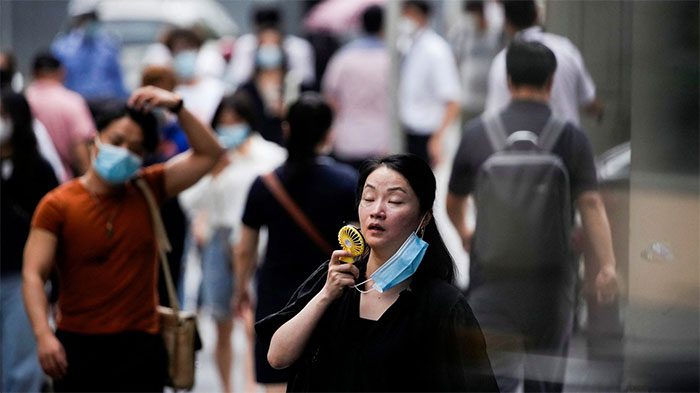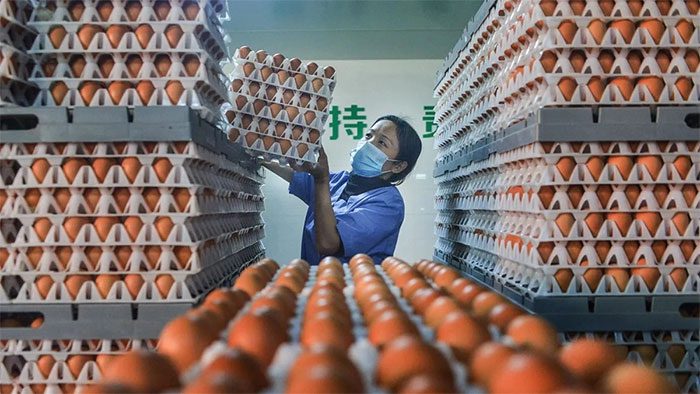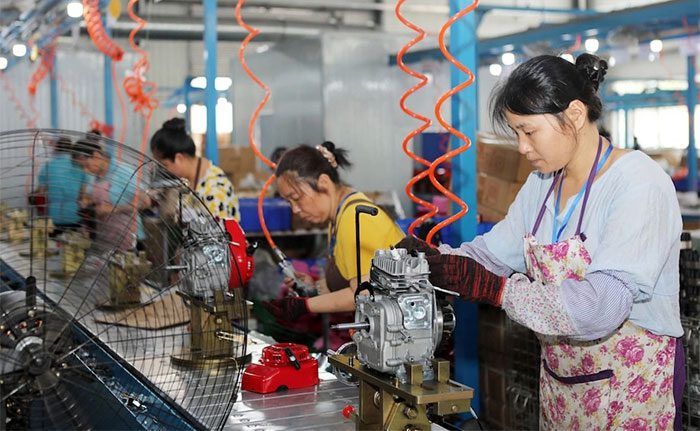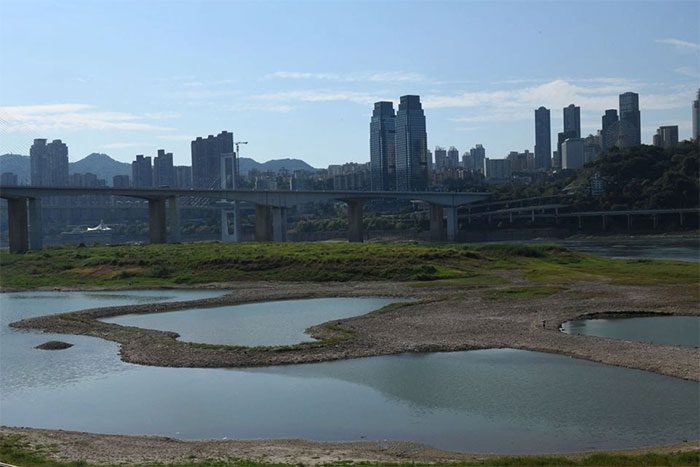The scorching temperatures in China have driven up chicken egg prices, damaging crops and causing severe electricity shortages for both production activities and daily life.
Many major cities in China have recorded record hot days. The national meteorological agency issued a red alert on August 15.
The heatwave has put stress not only on humans but also on animals.
In Hefei, farmers reported a decrease in egg production due to the heat, according to the Jianghuai Morning News. The report also mentioned that some farms have installed cooling systems for their chickens.
However, the rising egg prices are just one of the consequences of the record heat. Households and businesses in many regions of China are experiencing adverse effects on prices and daily life due to the extreme weather in recent days, according to AFP.
The Worst Heatwave in 60 Years
Chinese media reported that this heatwave has now lasted for 64 days. This is the longest heatwave since the country began meticulous weather records in 1961, according to data from the National Climate Center.
The number of weather stations recording temperatures of 40 degrees Celsius or higher has reached 262, also the highest level. Eight locations have recorded temperatures reaching 44 degrees Celsius.

Some regions of China are experiencing the worst heatwave in 60 years. (Photo: Reuters).
Continuous high temperatures are expected to persist in Sichuan and large areas of central China until August 26, according to the forecasting center.
Cai Wenju, a climate researcher at the Commonwealth Scientific and Industrial Research Organisation (CSIRO), Australia’s national science agency, stated that a “special case” of high pressure from the subtropical high over the western Pacific, extending across much of Asia, is likely the cause of this severe heatwave.
Inflation Rising Due to Heat
In Hefei, the capital of Anhui province, chicken egg prices have increased by about 30% due to supply shortages. Similar increases have been reported in Hangzhou and Hai’an, according to local media.
The Hefei Evening News reported that so far, they have recorded 14 days with temperatures above 38 degrees Celsius, noting that this is a record.
Although the number of laying hens in China has not decreased, they eat less on hot days, explained the Qianjiang Evening News.

An egg production facility in Hubei province, Central China. (Photo: AFP).
The extreme heat in China has also caused crop failures in many areas, adding pressure to inflation.
“Affected by the continuous high temperatures in many places, the price of fresh vegetables has increased by 12.9% compared to the same period last year,” said Fu Linghui, spokesperson for the National Bureau of Statistics, at a press conference on August 15 in Beijing.
He pointed out that the severe heat has caused drought in some agricultural areas in the south. In the north, rain and floods have also led to crop failures.
Electricity Crisis
In addition to affecting poultry farms, the heatwave has forced authorities to ration electricity in Sichuan, a major semiconductor manufacturing hub in China.
Provinces such as Zhejiang, Jiangsu, and Anhui, which rely on electricity from western China, have also issued electricity restrictions for industries to ensure residential power supply, local media reported.
Sichuan, which relies on hydropower for 80% of its electricity, ordered lithium, fertilizer, and other metal producers to shut down or limit production amid the worst heatwave in 60 years on August 14.
High temperatures and little rain this summer have reduced hydropower output in the province of 83.75 million people while increasing electricity demand for air conditioning.
Analysts suggest that if the heatwave continues, the electricity crisis could spill over into eastern provinces like Zhejiang and Jiangsu, which partially rely on electricity from Sichuan.
According to state media and a power company, Sichuan province began restricting electricity supply to households, offices, and shopping centers on August 17 due to severe electricity shortages caused by the extreme heat and drought.

Electricity shortages due to the heat have forced numerous factories in Sichuan province to halt operations for several days. (Photo: AFP).
According to the official WeChat account of Dazhou Energy Group, residential areas, offices, and shopping centers in Dazhou, a city of 5.4 million people, were informed about rotating power outages lasting several hours throughout August 17.
Power cuts for residential use are rare because during electricity shortages, China typically reduces industrial power first to ensure residential supply.
In a call for energy conservation, government offices have been asked not to set air conditioning below 26 degrees Celsius or to shut down elevators on the first three floors, the Sichuan Daily, a government-run newspaper, reported on the front page on August 17.
Fountains, light shows, and nighttime commercial activities will be suspended, the newspaper reported.
Threatening Water Security
In Jiangxi province, eastern China, which is suffering from a severe drought, 11,000 people are struggling to access drinking water, while more than 140,000 hectares of crops have been damaged, Xinhua reported on August 16.
The Ministry of Water Resources of China stated in a notice on August 17 that the drought across the Yangtze River basin has “negatively affected the drinking water security of rural residents and livestock, as well as the development of crops.”

The bed of the Yangtze River exposed in Chongqing, China, on August 17. (Photo: Reuters).
The ministry called on localities to accurately assess the drought-affected areas and develop plans to maintain water resources, including through temporary water transfers from areas with more water, developing new sources, and expanding pipeline networks.
To boost supplies downstream, the Three Gorges Dam, China’s largest hydropower project, will also increase water discharge by an additional 500 million cubic meters over the next 10 days, the agency announced on August 16.
Earlier this week, the Ministry of Finance stated that some livestock from drought-stricken areas have been temporarily moved to other regions, and announced a relief fund of 300 million yuan (approximately 44.3 million USD) for disaster relief.
On August 17, Hubei province in central China became the latest province to announce a widespread weather modification program, deploying aircraft to spray silver iodide into clouds to induce rain.
Other areas along the Yangtze River have also implemented a “cloud seeding” program, but with the cloud coverage being too thin, activities in some drought-stricken areas of the Yangtze River basin remain in a waiting state.




















































